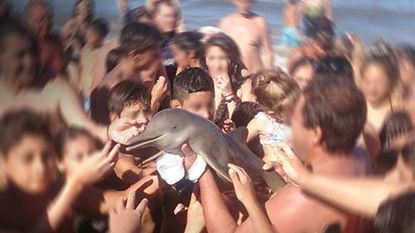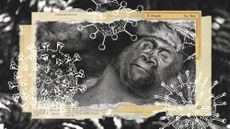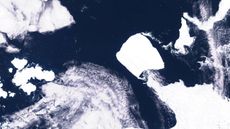Dolphin 'already dead' when beach-goers took photos
Holidaymaker dismisses claims that Buenos Aires crowd posed for selfies with a live animal and says its body had been washed up

Holidaymakers have denied pulling a live dolphin from the sea in order to pose for selfies with it. The animal reportedly died after being passed around the crowd in Argentina.
Two rare Franciscana dolphins, one of the smallest breeds, were said to have been seized by beach-goers after washing up in the surf at the Santa Teresita resort in Buenos Aires.
Photos show throngs of tourists crowding round a dolphin as it is passed around for them to touch and hold. One video shows a man carrying one of them in his arms.
Subscribe to The Week
Escape your echo chamber. Get the facts behind the news, plus analysis from multiple perspectives.

Sign up for The Week's Free Newsletters
From our morning news briefing to a weekly Good News Newsletter, get the best of The Week delivered directly to your inbox.
From our morning news briefing to a weekly Good News Newsletter, get the best of The Week delivered directly to your inbox.
The lifeless body of a Franciscana dolphin was later found on the sand, apparently abandoned. The fate of the other animal is unclear.
However, one of the tourists who posted photos has told national news channel Telefe Noticias his pictures had been misinterpreted and the animal was dead before the crowd handled it.
"It washed up already dead. They took it back to the water but it wouldn't go back out," said Hernan Coria. He added that several other dead dolphins had washed up on nearby beaches.
Wildlife experts and conservationists have expressed horror and disgust over the incident.
"The Franciscan, like other species, cannot remain out of the water for long," conservation charity Vida Silvestre said. "Hot weather will cause rapid dehydration and death."
The group urged anyone who spots a stranded dolphin to act responsibly. "It is vital that people help to rescue these animals, because every Franciscana counts," it said, telling people to contact marine specialists immediately upon finding a dolphin and then attempt to keep the animal cool until the experts arrive.
The Franciscana dolphin, so called because its brownish skin recalls the habit of a Franciscan monk, is classified as "vulnerable" in the International Union for Conservation of Nature Red List of Threatened Species. Only an estimated 30,000 remain in the wild, the BBC reports, and the species is at particular risk of becoming tangled in fishing nets because of its distribution along the busy waters around Argentina, Brazil and Uruguay. Between 500 and 800 are caught that way every year in the waters around Buenos Aires alone.
Create an account with the same email registered to your subscription to unlock access.
Sign up for Today's Best Articles in your inbox
A free daily email with the biggest news stories of the day – and the best features from TheWeek.com
-
 'A speaker courageous enough to stand up to the extremists in his own party'
'A speaker courageous enough to stand up to the extremists in his own party'Instant Opinion Opinion, comment and editorials of the day
By Harold Maass, The Week US Published
-
 How could the Supreme Court's Fischer v. US case impact the other Jan 6. trials including Trump's?
How could the Supreme Court's Fischer v. US case impact the other Jan 6. trials including Trump's?Today's Big Question A former Pennsylvania cop might hold the key to a major upheaval in how the courts treat the Capitol riot — and its alleged instigator
By Rafi Schwartz, The Week US Published
-
 Today's political cartoons - April 18, 2024
Today's political cartoons - April 18, 2024Cartoons Thursday's cartoons - impeachment Peanuts, record-breaking temperatures, and more
By The Week US Published
-
 How the EU undermines its climate goals with animal farming subsidies
How the EU undermines its climate goals with animal farming subsidiesUnder the radar Bloc's agricultural policy incentivises carbon-intensive animal farming over growing crops, despite aims to be carbon-neutral
By Harriet Marsden, The Week UK Published
-
 Chimpanzees are dying of human diseases
Chimpanzees are dying of human diseasesUnder the radar Great apes are vulnerable to human pathogens thanks to genetic similarity, increased contact and no immunity
By Harriet Marsden, The Week UK Published
-
 Can the world really wean itself off coal?
Can the world really wean itself off coal?Today's Big Question 'Record' global consumption is set to fall soon but growing demand in China and India could increase tensions
By Harriet Marsden, The Week UK Published
-
 The microplastics hurricanes blowing across North America
The microplastics hurricanes blowing across North AmericaUnder the Radar New research confirms global pervasiveness of harmful microplastic pollution
By The Week Staff Published
-
 What can Cop28 really achieve?
What can Cop28 really achieve?Today's Big Question Climate summit in UAE proves controversial as UN warns world is falling short of global warming targets
By The Week UK Published
-
 A23a: why world's biggest iceberg is on the move
A23a: why world's biggest iceberg is on the moveThe Explainer The mass of ice is four times the size of New York and 'essentially' an island
By Chas Newkey-Burden, The Week UK Published
-
 Libya floods: death toll set to rise with 10,000 reported missing
Libya floods: death toll set to rise with 10,000 reported missingMore than 6,000 people reported dead, with hundreds of bodies still washing ashore
By Arion McNicoll Published
-
 Thousands feared dead in catastrophic Libya flooding
Thousands feared dead in catastrophic Libya floodingSpeed Read A powerful Mediterranean storm pummeled Libya's northeast coast, wiping out entire neighborhoods
By Peter Weber Published